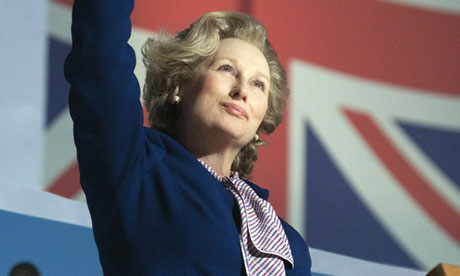
Meryl Streep is undoubtedly a great actor. Amazingly, I am not. So I did my best to act casually when she served me apple pie that she had baked herself. But my stomach was churning because of the film in which I had just seen her. She plays Margaret Thatcher in the biopic The Iron Lady. She is mesmeric on screen and indeed in the flesh.
I have never before been to a screening and then taxied with a handful of female journalists to a house where a superstar cooks for you. On the way we were given readymade gin and tonics. "I have never had one of these before," said my colleague Polly Toynbee, "it's rather lovely."
"But what are we going to say?" I wailed, as we wondered if we could escape for a pizza with Jenni Murray. For everyone involved in the film, including the director, Phyllida Lloyd, and the writer, Abi Morgan, were to be at the dinner too. All good women. Strong and true and not natural fans of Thatcher.
Yet as the film starts with Thatcher as a senile, lonely old lady, it inadvertently garners sympathy for her. One cannot still be angry with a weak old woman, surely? Well there is always an exception to the rule. Thatcher was always the exception to the rules, the exception that kept the rules in place. After a few drinks, I think I tried to tell Meryl that I was of the Tramp the Dirt Down persuasion, but I wasn't, at that stage, sure if she knew the Elvis Costello song.
I did tell her that when Thatcher was elected it was only a matter of time before we began to see profound change. I had just been hitchhiking around Europe and was shocked to see beggars on the streets of Lisbon. Within a year, London was full of young homeless people and Cardboard City was erected.
But I can see why any clever actor would be drawn to play Thatcher – the woman is the ultimate drama queen, performing "femininity" when it suited her. Thatcher instinctively knew how to switch between housewife/ governess/warrior queen, and Streep captures this perfectly. The film's problem is that it buys into Thatcher's own interpretation of herself far too much. For crucial to her own self-image was the persona of a woman at perpetual war, politically, nationally, internationally. Where there was harmony she brought discord.
Some Tories have said it is demeaning to portray Thatcher's dementia. I note they are still prepared to dress her up and wheel her out when it suits them. My difficulty with the film is that there is no sense of Thatcher's political coming of age. The supreme conviction politician, yes, but those convictions were driven by ideology shaped by Keith Joseph among others. Privatisation, the selling off of council housing, war against the unions was all done in the name of monetarism, or "sado-monetarism" as some dubbed it. The Iron Lady though, shows Thatcher in a vacuum, a lone woman battling against ranks of men.
The footage that threads through the film – Brixton in flames, the miners being pushed back by massed ranks of police – shows all opposition to her as being violent rioters and trade unionists. This is a conservative narrative and just not how it was.
The luminous Streep talked as we ate of how difficult it is to get a film made for older women and not teenage boys. Mamma Mia! helped change that. I guess this wasn't the time to say I don't even like Abba. For what is still vivid for me are those "The Enemy Within" badges that I stuck on my pregnant belly during the miners' strike, our last civil war. The Enemy Within remains the clue to Thatcher's psychological makeup surely? But we were now talking about the brilliance of the actual makeup that ages Streep in the film.
As the film trots through history, we see Thatcher's high point: actual war. The Falklands. We see that she was indeed transgressive in terms of class and gender, so inevitably the film makes her heroic.
We don't see the victims of her policies. The mess we are in now is a direct result of much of what she initiated. Part of her phallic potency was always to conjure the chaos about to break out unless we buckled under. The film feels shot from this viewpoint.
But Streep told us this was a film about grief and loss. It is. The Tories are still in mourning for her and feel guilty about deposing her. She is the ghost that has haunted every leader since. The context into which this film will be released is one of Tory government, social unrest and deep recession. Many will pine again for such a strong leader, forgetting how such leaders punish the weak.
To bite the hand that fed me pie is a bit much, I know. All I can say is that the hatred Thatcher invokes is bitter and visceral for those of us who lived through it. But this film, because of its magnificent central performance, will evoke more celebration of her. I am happy enough to pay my respects to Streep, who even came out into the garden for a quick fag with us, but pay respect to the woman she portrays? Sorry no. Can't pay, won't pay, as we once said of the poll tax.

